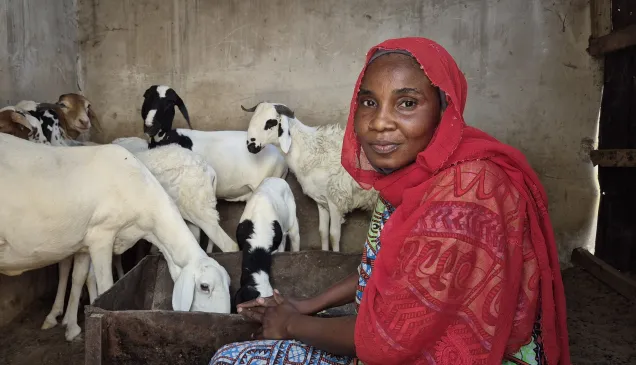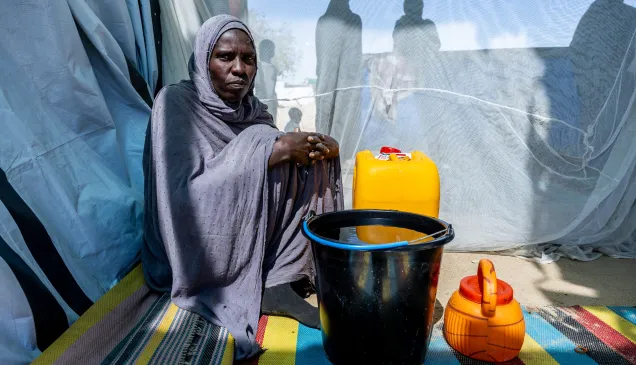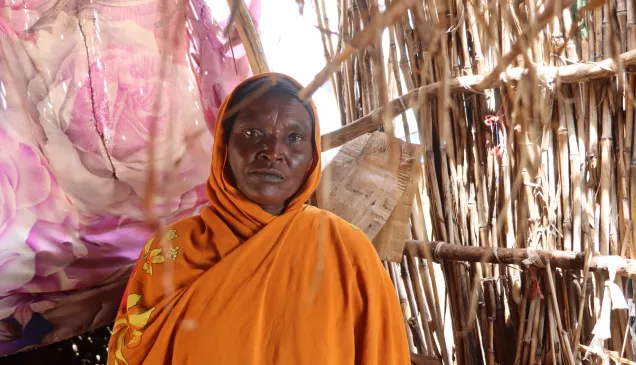Lake Chad region: Six-year-old captive Yacoob reunited with family at last
Yacoob Idriss'* story is like that of many other children living in the Lake Chad region. One morning, armed men attacked his village, Doron Baga, in the north-eastern Nigerian state of Borno. They later captured about 20 of the village's inhabitants, including Yacoob.
The attack
"I have lots of friends and toys at home," remembers Yacoob nostalgically. "The village was attacked one morning while I was playing hide-and-seek with my friends. We heard crying and shouting, and other deafening noises. I didn't understand what was happening. People were running and there was fire everywhere. I was still in my hiding place under a mat."
Yacoob found himself in a group of some 20 people who had fallen into the hands of armed groups. "I looked for my family in the group. I felt so alone. I was searching for a familiar face, but there was no one." He resigned himself to his fate.
There were many other children, boys and girls. They were not allowed to play with balls or dolls. Yani Koura*, a mother who was in charge of watching over them, taught them that "it is haram (forbidden) to play with dolls and for boys to play with balls." Girls and boys always had to be separated, something that Yani Koura repeated "must be respected at all times".
Yacoob would play with his "gun", made from millet stalks and rubber. It reminded him of the attacks he had witnessed, images forever seared into his childhood memory.
"We often played in a group. They gave us roles. I was always the Emir's horse." Demonstrating, he explains, "I would get down on all fours like this to carry whoever was playing the Emir. They taught us that he was protected and that he could not die."
"The other children played fighters. Every day, before playing, we had to repeat the Arabic alphabet. We would sit on the ground, at the foot of a big tree, in front of our mallam (Quran teacher)." The mallam also led the prayer, which the children attended, lined up behind the older people. "The mallam never smiled and he had a stick in his hand that he would use to hit the children who made mistakes." Telling this story, Yacoob looks around him, uneasy, as if he were still in the camp.
One day, about seven months later, an aerial bombardment by the army put an end to his ordeal. "We heard explosions and shots, and people were running with nowhere to go."
Escape to Niger
Yacoob followed a woman who already had nine other children and who later became his guardian. They reached Maiduguri, the capital of Borno state, heading west to Hadejia before taking refuge across the border in N'Guigmi in Niger. "She was my only family and she loved me very much."
Hearing about his story, the ICRC registered the little boy to help him find his family. His file was sent to Red Cross teams across the Lake Chad region. The difficulties of gaining access to certain locations and the frequent population displacements resulting from the conflict and growing insecurity complicated efforts to find his family.
Finally, after having visited several sites for displaced people, teams from the Red Cross of Chad located Yacoob's parents in the Dar es Salaam camp there.
Yacoob is reunited with his family
Yacoob had endured a year of anguish, not knowing what had happened to his parents, brothers and sisters. Despite the hopeful words of his guardian, he never stopped fearing the worst. But then, a breakthrough.
"One morning, I was woken by cries of joy. My guardian took my hand and the people from the Red Cross gave me the news: they had found my parents. When the man from the Red Cross held the phone out to me and said, 'It's your mother', I cried." Over the phone, Yacoob's trembling voice was barely audible.
He was shown photos of his family and he began to name his brothers and sisters one by one. Then, with a smile, he pointed at a photo and asked the name of the baby that his mother was holding. It was his little brother, born after the separation.
When the time came to leave for Chad, Yacoob was torn between the joy of being reunited with his family and the pain of being separated from his guardian and his friends. He left his little mudbrick hut to rejoin his family in the Dar es Salaam camp in Chad.
* Not their real names



